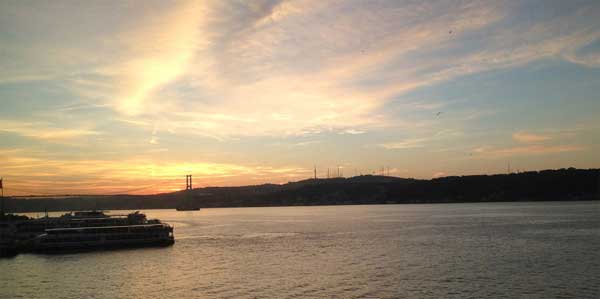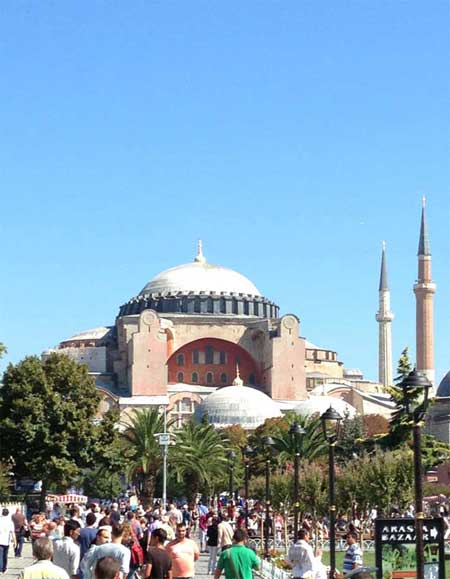On the great divide
 |
|
Sunrise over the Bosphorus seen from the room balcony of the strategically located Shangri-La Istanbul. [Photo by Pauline D. Loh / China Daily] |
It is an ancient city that sits squarely between two continents, and a place where history meets and greets modern visitors with grace and hospitality. Pauline D. Loh visits Turkey's capital on the Golden Horn.
 |
|
Hagia Sophia is one of the oldest cathedrals in Europe, dating back to the days of the Roman Emperor Constantine. It is now a museum. [Photo by Pauline D. Loh / China Daily] |
Istanbul.
The very name itself conjures up exotic images of veiled belly dancers, whirling dervishes, blue waters and flashes from Indiana Jones and The Raiders of the Lost Ark. In reality, Istanbul is a vibrant city that straddles cultures and continents.
The Golden Horn, an inlet of the Bosphorus Straits, cuts the city neatly into two, separating its European side from its Asian portion. Most tourists would land in Istanbul in Asia and be ferried to their hotels in Europe across the landmark Bosphorus Bridge.
We were fortunate enough to stay at the Shangri-La Bosphorus, which overlooks this famous stretch of water and has a most illustrious neighbor in the Dolmabahce Palace - one of several in Istanbul filled with glittering gold and crystals accompanied by narratives that sound like extracts from A Thousand and One Nights.
It is one of the first sights we visit. Although photographs are forbidden within the palace, we manage to capture images of the lovely garden, with its picturesque landscaping, fountains, playful statues of lion families and that million-dollar view of the Bosphorus.
Visitors cannot help but be awed by the sense of history here even as they enjoy all the luxuries of modernity.
As Constantinople, it was a city founded by Constantine the Great around AD 300 and went on to serve four empires under Roman, Byzantine, Latin and Ottoman rulers. Constantine converted to Christianity and his capital became a regional center for the faith for a long time until the Muslim Ottoman sultans conquered the city in the 15th century.
To understand modern-day Turkey, get the historical facts right and you will truly appreciate its cultures and relics including the impressive underground water cisterns, the Roman-styled obelisks at the Hippodrome, the originally Christian Hagia Sophia which inspired the later-day Blue Mosque.
Hagia Sophia, apart from its celebrated architecture, is also a reflection of the city's changing fortunes, having turned from church to mosque to museum.
But it is the other museums and palaces in Istanbul that will keep the visitor very busy, including the unique Museum of Innocence.
As in so many other things in Istanbul, the Museum of Innocence sends visitors into the Great Divide. This time, it is the dim recesses between fact and fiction, dream and reality.




















